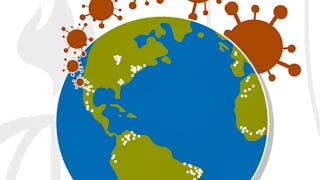Reflections on patients, policies, pan-epidemics, prose and medical humanities from a 40-year career fighting epidemics around the world by an infectious disease public health physician. Examples include HIV/AIDS, Anthrax, SARS, MERS, H5N1 and H1N1 influenza, Nipah, Ebola (with MSF 2014), Zika, Plague (with WHO 2017) and COVID-19. Working side-by-side with international colleagues to provide hands-on patient care and to share stories is an expression of medical humanities.
通过 Coursera Plus 解锁访问 10,000 多门课程。开始 7 天免费试用。


您将学到什么
Anticipate, Recognize, Act
What's Next is Already Here
Create Synergies of Strengths
您将获得的技能
要了解的详细信息

添加到您的领英档案
4 项作业
了解顶级公司的员工如何掌握热门技能

该课程共有5个模块
Reflections on patients, policies, pan-epidemics, prose and medical humanities from a 40-year career fighting epidemics around the world by an infectious disease public health physician. Examples include HIV/AIDS, Anthrax, SARS, MERS, H5N1 and H1N1 influenza, Nipah, Ebola (with MSF 2014), Zika, Plague (with WHO 2017) and COVID-19. Working side-by-side with international colleagues to provide hands-on patient care and to share stories is an expression of medical humanities. Dr. Lucey is the originator of the Smithsonian Museum Exhibit on Epidemics 2018-2022, an advocate of One Health, and author of 170 blogs on COVID and other new epidemics since January 2020 on the Science Speaks website of the Infectious Disease Society of America. One best career lesson is to “Anticipate, Recognize, Act” because “What’s next is already here, we just haven’t recognized it”.
涵盖的内容
1个视频
Module One provides you with an introduction to the context and perspective of Dr. Lucey. He is a public health and infectious disease physician and epidemiologist who has helped fight epidemics around the world beginning in 1982 in San Francisco before the HIV virus was discovered but long after the virus discovered us. This module offers a chronology of his field experience in over 10 epidemics in 5 regions of the world. A Medical Humanities perspective is included using his own list of 40 one-phrase reflections on epidemics, distilled from 1982-2022, and the first of several narrative stories from the 2014 Ebola pan-epidemic in West Africa. These stories in module 1 and module 4 illustrate some of the 40 one-phrase reflections and their origins. A summary is also provided of the exhibit (2018-2022) proposed in 2014 by Dr. Lucey at the Smithsonian National Museum of Natural History on viral epidemics that originated in animals, using the “One Health” approach that integrates human, animal, and environmental health.
涵盖的内容
7个视频1篇阅读材料1个作业1个讨论话题
Module Two provides six examples of epidemics that began months, years or decades before they were first recognized or their viral cause “discovered”. These include HIV-1 (< 1959-1983), Nipah (1998-1999), SARS (2002-2003), MERS (2012-2013), Ebola in Guinea (2013-2014), and Zika clusters of neurological diseases (2014-2016). The unifying theme of this module focusing on past epidemics is: “What’s next is already here, we just haven’t recognized it yet” (refection # 40 of 40). One key objective of this module is to lead the learner to ask what epidemics are already here today in the world, but have not yet been recognized or their cause “discovered”.
涵盖的内容
8个视频1篇阅读材料1个作业1个讨论话题
Module Three focuses on the theme of “anticipate, recognize, act” to build on the previous module with its six past examples of epidemics that were not recognized quickly. Examples are provided of the process and policies whereby the World Health Organization (WHO) evaluates recently recognized epidemics to determine if they should be declared a “Public Health Emergency of International Concern" (PHEICS). Two examples of potential future epidemics and information that should be anticipated and that will be important on Day One (1) are presented. These examples, of the many potential ones, are (1) A Nipah virus epidemic outside south Asia and SE Asia where all past Nipah outbreaks have occurred (e.g., China, Africa, Europe, or the Americas); (2) A multidrug-resistant anthrax epidemic due to the Bacillus anthracis bacteria. In addition, links to over 10 additional outbreaks around the world that have occurred in 2020-2023 are provided in blogs written by the instructor on the “Science Speaks” website of the Infectious Disease Society of America (IDSA). Examples are analyzed from the contextual framework of “anticipate, recognize, act”. They include mpox (many nations), melioidosis (USA), Langya henipavirus (China), H5N8 avian influenza (Russia), unexplained pneumonia (Argentina), unexplained hepatitis (Europe and USA) and more.
涵盖的内容
9个视频1篇阅读材料1个作业1个讨论话题
Module Four focuses on Medical Humanities and literature regarding both patients and healthcare providers. Several sources of such information include writings by Albert Schweitzer (“Reverence for Life”) Alexander Solzhenitsyn (“Cancer Ward”). In addition, some of the 40 reflections regarding both patients and healthcare worker colleagues from Liberia and the USA. Lastly, a general reference is made to an ongoing 2-volume ‘library collection’ of over 180 medical wisdom stories shared by alumni from the instructor’s Geisel School of Medicine at Dartmouth with its graduating medical students each year beginning in 2017.
涵盖的内容
7个视频1篇阅读材料1个作业1个讨论话题
位教师

从 Public Health 浏览更多内容
 状态:预览
状态:预览The University of Hong Kong
 状态:免费
状态:免费Johns Hopkins University
 状态:免费试用
状态:免费试用Imperial College London
 状态:免费试用
状态:免费试用Johns Hopkins University
人们为什么选择 Coursera 来帮助自己实现职业发展




常见问题
To access the course materials, assignments and to earn a Certificate, you will need to purchase the Certificate experience when you enroll in a course. You can try a Free Trial instead, or apply for Financial Aid. The course may offer 'Full Course, No Certificate' instead. This option lets you see all course materials, submit required assessments, and get a final grade. This also means that you will not be able to purchase a Certificate experience.
When you purchase a Certificate you get access to all course materials, including graded assignments. Upon completing the course, your electronic Certificate will be added to your Accomplishments page - from there, you can print your Certificate or add it to your LinkedIn profile.
Yes. In select learning programs, you can apply for financial aid or a scholarship if you can’t afford the enrollment fee. If fin aid or scholarship is available for your learning program selection, you’ll find a link to apply on the description page.
更多问题
提供助学金,



